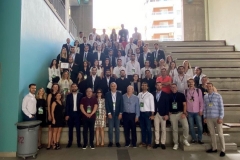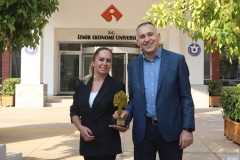
FACULTY OF BUSINESS
Department of Logistics Management
GEAR 203 | Course Introduction and Application Information
| Course Name |
Masterpieces in Music History
|
|
Code
|
Semester
|
Theory
(hour/week) |
Application/Lab
(hour/week) |
Local Credits
|
ECTS
|
|
GEAR 203
|
Fall/Spring
|
3
|
0
|
3
|
4
|
| Prerequisites |
None
|
|||||
| Course Language |
English
|
|||||
| Course Type |
Service Course
|
|||||
| Course Level |
First Cycle
|
|||||
| Mode of Delivery | - | |||||
| Teaching Methods and Techniques of the Course | - | |||||
| Course Coordinator | - | |||||
| Course Lecturer(s) | ||||||
| Assistant(s) | - | |||||
| Course Objectives | The aim of this course is to learn the masterworks of music and to identify the essential differences between them and any ordinary work. |
| Learning Outcomes |
The students who succeeded in this course;
|
| Course Description | Through this course masterworks of music and basic information on those works will be presented |
|
|
Core Courses | |
| Major Area Courses | ||
| Supportive Courses | ||
| Media and Management Skills Courses | ||
| Transferable Skill Courses |
WEEKLY SUBJECTS AND RELATED PREPARATION STUDIES
| Week | Subjects | Related Preparation |
| 1 | Orientation and introduction to the course | Orientation and introduction to the course |
| 2 | Beethoven: Symphony no 5 | Beethoven: Symphony no 5 |
| 3 | Bach toccata and fugue BWV 565, Mozart Symphony no 40 | Bach toccata and fugue BWV 565, Mozart Symphony no 40 |
| 4 | Beethoven Symphony no 7 | Beethoven Symphony no 7 |
| 5 | Dvorak: Symphony no 9 “From the new world” | Dvorak: Symphony no 9 “From the new world” |
| 6 | Grieg: Piano Concerto Grieg: Peer Gynt Suit | Grieg: Piano Concerto Grieg: Peer Gynt Suit |
| 7 | Beethoven: Symphony no 9 | Beethoven: Symphony no 9 |
| 8 | Tchaikovsky: Piano Concerto | Tchaikovsky: Piano Concerto |
| 9 | Mozart Don Giovanni act1 | Mozart Don Giovanni act1 |
| 10 | Mozart Don Giovanni act 2 | Mozart Don Giovanni act 2 |
| 11 | Midterm | |
| 12 | Carl Orff: Carmina Burana | Carl Orff: Carmina Burana |
| 13 | Bach: Coffee Cantata Bach: Concerto for 2 pianos in C major | Bach: Coffee Cantata Bach: Concerto for 2 pianos in C major |
| 14 | Liszt Piano Concerto no 1 Mendelssohn Violin Concerto op 64 | Liszt Piano Concerto no 1 Mendelssohn Violin Concerto op 64 |
| 15 | Student Presentation | |
| 16 | General evaluation |
| Course Notes/Textbooks | Powerpoint Presentation and Personal Archive |
| Suggested Readings/Materials | Sadie, Stanley Grove Music Dictionary |
EVALUATION SYSTEM
| Semester Activities | Number | Weigthing |
| Participation |
1
|
10
|
| Laboratory / Application | ||
| Field Work | ||
| Quizzes / Studio Critiques | ||
| Portfolio | ||
| Homework / Assignments |
1
|
15
|
| Presentation / Jury |
1
|
15
|
| Project | ||
| Seminar / Workshop | ||
| Oral Exams | ||
| Midterm |
1
|
25
|
| Final Exam |
1
|
35
|
| Total |
| Weighting of Semester Activities on the Final Grade |
4
|
65
|
| Weighting of End-of-Semester Activities on the Final Grade |
1
|
35
|
| Total |
ECTS / WORKLOAD TABLE
| Semester Activities | Number | Duration (Hours) | Workload |
|---|---|---|---|
| Theoretical Course Hours (Including exam week: 16 x total hours) |
16
|
3
|
48
|
| Laboratory / Application Hours (Including exam week: '.16.' x total hours) |
16
|
0
|
|
| Study Hours Out of Class |
14
|
2
|
28
|
| Field Work |
0
|
||
| Quizzes / Studio Critiques |
0
|
||
| Portfolio |
0
|
||
| Homework / Assignments |
1
|
8
|
8
|
| Presentation / Jury |
1
|
10
|
10
|
| Project |
0
|
||
| Seminar / Workshop |
0
|
||
| Oral Exam |
0
|
||
| Midterms |
1
|
8
|
8
|
| Final Exam |
1
|
8
|
8
|
| Total |
110
|
COURSE LEARNING OUTCOMES AND PROGRAM QUALIFICATIONS RELATIONSHIP
|
#
|
Program Competencies/Outcomes |
* Contribution Level
|
||||
|
1
|
2
|
3
|
4
|
5
|
||
| 1 | To be able to analyze complex problems in the field of logistics and supply chains |
|||||
| 2 | To be able to have good knowledge of sector related market leaders, professional organizations, and contemporary developments in the logistics sector and supply chains |
|||||
| 3 | To be able to participate in the sector-related communication networks and improve professional competencies within the business sector |
|||||
| 4 | To be able to use necessary software, information and communication technologies in the fields of logistics management and supply chain |
|||||
| 5 | To be able to understand and utilize the coordination mechanisms and supply chain integration |
|||||
| 6 | To be able to analyze the logistics and supply chain processes using the management science perspective and analytical approaches |
|||||
| 7 | To be able to design, plan and model in order to contribute to decision making within the scope of logistics and supply chains |
|||||
| 8 | To be able to interpret and evaluate the classical and contemporary theories in the field of logistics and supply chains |
|||||
| 9 | To be able to conduct projects and participate in teamwork in the field of logistics and supply chains |
|||||
| 10 | To be able to have an ethical perspective and social responsiveness when making and evaluating decisions. |
|||||
| 11 | To be able to collect data in the area of logistics and communicate with colleagues in a foreign language ("European Language Portfolio Global Scale", Level B1). |
|||||
| 12 | To be able to speak a second foreign at a medium level of fluency efficiently. |
|||||
| 13 | To be able to relate the knowledge accumulated throughout human history to their field of expertise. |
|||||
*1 Lowest, 2 Low, 3 Average, 4 High, 5 Highest
NEWS |ALL NEWS
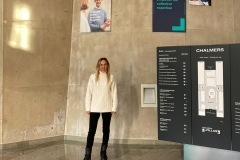
Teaching both at Izmir and Sweden
Making a difference with her successful work in the international arena, Assoc. Prof. Dr. Aysu Göçer, Lecturer at Department of Logistics Management,
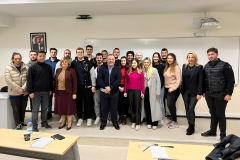
Memorial Scholarship reached to 78 young people
The education scholarship given on behalf of the late Doğan Turhan, the philanthropist from Izmir, the founder of one of Turkey's largest
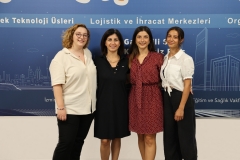
‘Green’ logistics going abroad
Assoc. Prof. Dr. Işık Özge Yumurtacı Hüseyinoğlu from Izmir University of Economics (IUE) Department of Logistics Management and her 3 students have

Double prize in logistics
The 'intelligent decision support system' named LTLZone, which was developed by a team of 3 people at Izmir University of Economics (IUE),
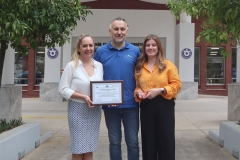
Double reward in logistics
The intelligent decision support system (IDSS) named ‘LTLZone’, which was developed by a team of 3 people at Izmir University of Economics

Department of Logistics Management 14th University-Industry Cooperation Event
Izmir University of Economics Logistics Management Department senior students continue to shed light on real logistics problems with the projects they developed





